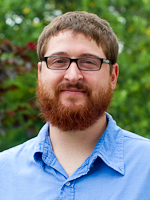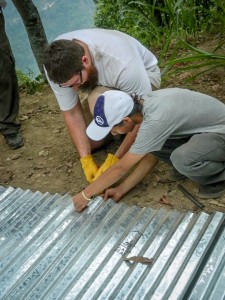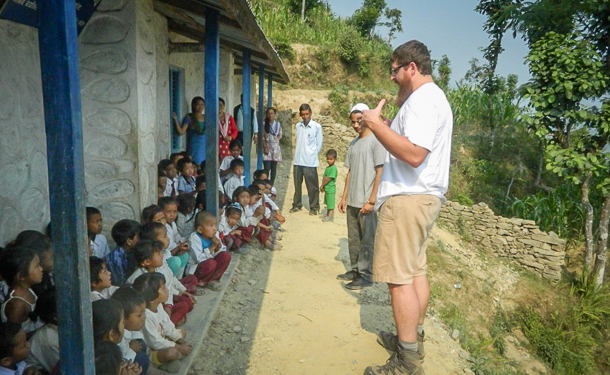Nate Koser spent two years of his adolescence in Nepal with his missionary parents. That’s why the professor of counseling at Eastern Mennonite University traveled back in June and why, when he speaks of the traumas the Nepali people have suffered since the magnitude-7.8 earthquake on April 25, he has a difficult time expressing what he saw.
“People are having a really hard time not living in that fear, that panic, that terror,” Koser says, adding that the region is experiencing continual aftershocks and tremors. “They are no longer reporting anything below a 4 magnitude. People don’t sleep in their houses because they are afraid they could collapse. These events aren’t in the past.”
A long family connection to Nepal

Koser traveled with his father, Rick, and his brother, Josiah, who was born in Nepal when the family lived there from 1996 to 1998. A family friend who oversees missional work in Kathmandu arranged for the Kosers to provide relief labor such as “tunnelhouse” shelters for those who have lost their homes. Additionally, Rick, an anesthesiologist with considerable experience on medical missions around the world, provided general medical services. Josiah, studying to be an exercise specialist, talked about the benefits of exercise for trauma healing. And Nate, a licensed psychotherapist, addressed fear, stress and trauma management with school children in Kuwapani and Sunday School teachers in Kathmandu.
“I talked about how the arts and play can be very helpful, especially for children,” he said. “The arts allow people to take experiences that are chaotic and create something more accessible for discussion and expression.”
It’s not the first time members of the Koser family have returned to Nepal since their two-year mission (they first visited in 1996 before moving there permanently). They have traveled to different regions of the country in 2000, 2006 and 2011, engaging in relief work and volunteering each time.
The complexity of aid
This latest trip into a disaster zone, however, impressed upon Koser the complexities of what academics call the disaster management cycle.
The most obvious evidence, Koser says, is the piles of aid and supplies lining the runway of the Kathmandu airport that have become political commodities. “Long stretches of palettes were sitting there because the government was conflicted about who would get the supplies, who would distribute them, and which party would be in control.”
He pointed out that if individual donors and government-sponsored aid organizations took a greater interest in tracking where their donations were going, the politics associated with distribution could potentially be reduced. [Read more about the country’s unstable political environment and the efforts of a young Nepali peacebuilder who came to EMU for training this summer.]

Reported death tolls are often used as a gauge to trigger relief efforts, yet Koser says he learned that the 8,019 dead reported by the country’s National Emergency Operations Center was actually an underestimation.
On the other hand, he says, Nepal’s economy depends on tourism and an accurate report of the devastation may discourage tourism.
“I was told to tell people when I got back to keep coming to Nepal. Go trekking. If people don’t get the message, then the livelihood of many people is exponentially worsened.” Koser says.
Media attention also helps generate relief, Koser said, but the media is always ready to move onto the next tragedy. The absence of media coverage may create the impression in the minds of donors that the disaster was resolved or the cause is hopeless.
Even weeks after his return, Koser is still grappling with the paradoxes of what he has seen.
Giving back and learning more
“I am making this trip for the people of Nepal,” Koser told his parents’ hometown newspaper before he left. “But it would be a lie to say that it is only for them. It is also for me. The Nepali people have given me an experience in life that has had such a profound effect, I am unable to articulate it in any adequate way. So, for this reason, I need to give back.”
This recent trip affirmed something he’s learned and practiced “over years of traveling, living in other places such as Nepal, and listening to people” in his local counseling practice. While the discipline of psychology tends to look for patterns and make generalizations based on the similarities between people, Koser says he strongly resists making generalizations about complex problems and jumping to a hasty answer before listening to each person. “Generalizations minimize people and reduce them to statistics. People are always the source of information, not matter what culture they come from.”

Thankyou so much for writing this amazing article!!.. Very well written and very informative!!.. Plus, I’m so proud of Nate and His passion for the Nepali people and love for the country!. Great piece!!.. Thankyou!.. TammyKoser
Great article. Proud of Nate and Josiah. Love Nate’s passion for Nepal.